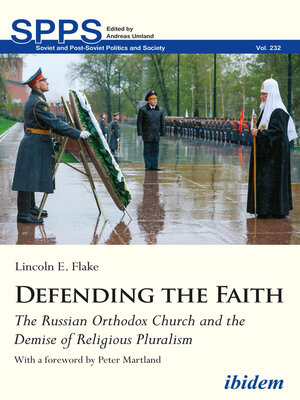Defending the Faith
ebook ∣ The Russian Orthodox Church and the Demise of Religious Pluralism · Soviet and Post-Soviet Politics and Society
By Andreas Umland

Sign up to save your library
With an OverDrive account, you can save your favorite libraries for at-a-glance information about availability. Find out more about OverDrive accounts.
Find this title in Libby, the library reading app by OverDrive.



Search for a digital library with this title
Title found at these libraries:
| Library Name | Distance |
|---|---|
| Loading... |
Freedom of religious expression and assembly has never been under greater threat in post-Soviet Russia. The infamous Yarovaya Law of 2016 has made good on previous legislative endeavors to curtail the activities of undesirable religious entities. Behind the curtain, the influence of the Russian Orthodox Church looms large over state policy and the decline in religious liberties and pluralism. Lincoln E. Flake explains the church's hostility to nontraditional groups as a consequence of historical-structural factors arising from its Soviet experience and immediate-strategic factors arising from its experience in the post-Soviet religious free market. It was not until the 2014 annexation of Crimea that church-state interests coincided to produce unprecedented collusion. The Church, which had previously only served symbolic purposes for domestic political advantage, was now required for more meaningful 'active measures' in Russia's all-of-government approach to advancing its national security strategy. Reciprocation produced the Yarovaya Law and further quid pro quos account for the relapse into religious intolerance. This study contextualizes the church's present-day posture on religious pluralism by appealing both to historical experience and insights that Rational Choice Theory offers to the study of religious actors and religious behavior.







